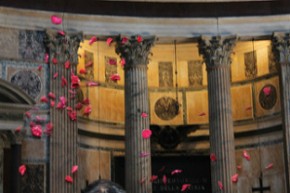On the verge of comprehension

I’ll be leaving Rome soon. I walk around the city, trying to memorize it: the angels on the Sant’Angelo bridge, purposeful and grave; the arms of the colonnade cradling St. Peter’s Square; the redbud trees lifting their branches like offerings. I hope to go home changed, but I don’t yet know what that change will be.
Before I leave, the church will celebrate one more great feast: Pentecost, that festival of communication and understanding. Licked by tongues of flame and filled with the Holy Spirit, Jesus’ disciples found themselves suddenly able to speak in many different languages and be understood by native speakers, “devout Jews from every nation under heaven.” What seems at first like a reversal of Babel becomes something even better: God’s reaffirmation of the variety of languages in which human beings speak of the things that matter most. On Pentecost, rather than scattering in confusion, people of many tongues gather close and listen together.
It feels right to mark the end of my time here with the feast of Pentecost. The story that Acts tells is the stuff of my dreams, in which suddenly I can speak Italian fluently and understand all the Italian spoken to me. When such things happen in waking life, they feel like miracles. I remember receiving a letter from my sister, years ago, soon after arriving in Bogotá, Colombia, for a year of study. “My host mom and sister are talking in the kitchen,” she wrote, her pen flying across the page, “and I can understand what they are saying!”




